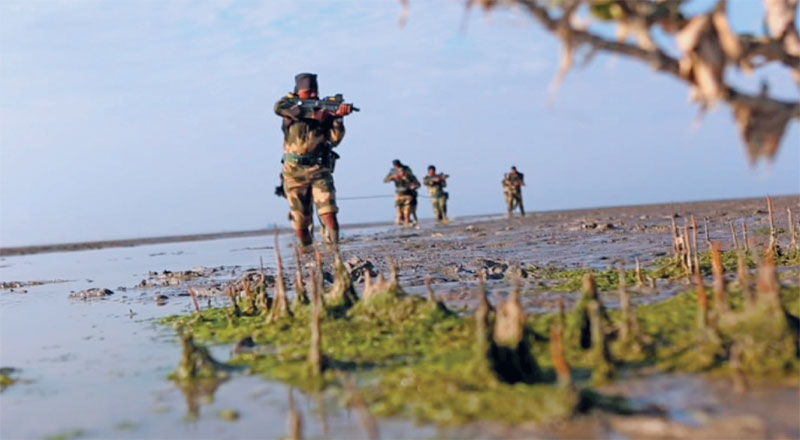The enhancement of BSF’s power in the border states will serve little purpose
 S.K. Sood
S.K. Sood
The ministry of home affairs (MHA), through its notification dated 11 October 2021, has enhanced the powers of Border Security Force (BSF) to carry out search, seizure, and arrest in Gujarat, Punjab, West Bengal, and Assam. The jurisdiction up to which the BSF can now exercise the police powers of BSF has been extended to 50kms from the borders in the states of Punjab, West Bengal and Assam. The jurisdiction in these states earlier was 15km. On the other hand, the jurisdiction has been reduced in Gujarat from 80km to 50km from the border. The powers remain unaltered in case of Rajasthan, J&K, and north-eastern states.
The move has resulted into a political brouhaha with opposition parties alleging it to be an attack on federalism whereas the government view is that it was essential to enhance the powers in view of increasing security threats.
The main reasons cited for enhancement of these powers are bringing in uniformity of jurisdiction of BSF across the India-Bangladesh and India-Pakistan border besides enhancing the security of borders keeping in view of the changed tactics being adopted by trans-border criminals. Likely impact of the move on security of the borders as well as on the functioning of the BSF, needs to be analysed dispassionately from professional angle.
The BSF though raised in 1965, was initially delegated the police powers of arrest search and seizure vide a notification issued in 1969 after the BSF Act came into effect in 1968. The powers were delegated using the provisions of Section 139 of the BSF Act 1968. Some amendments were made in the notification in 1973 and thereafter seven years ago by this National Democratic Alliance (NDA) government on 3 July 2014.
The delegation of police powers to the BSF personnel after it was raised in 1965 was considered essential in view of the circumstances prevailing at that time. The circumstances varied from state to state. Hence the limit of jurisdiction was different for different states. The circumstances vary from state to state even now. Hence, reason of uniformity advanced for the October 11 amendment does not sound convincing.
Different limits of jurisdiction for different states were considered appropriate because of varying terrain conditions including lay of the land and population composition besides the crime pattern and presence and effectiveness of police in border areas.
The population density, especially, in remote border areas of Gujarat and Rajasthan continues to be low. There were very few population centres within the vicinity of 80-50 kms from border in these states. Besides this, the police presence in these remote areas was very limited, there being hardly any thanas or police posts. The police visit to the area were not too frequent. BSF thus was the only law enforcing agency representing the government in remote border areas. Even the Border Out Posts (BOPs) of BSF were located quiet far away from the border (these have been subsequently moved forward closer to the border). It was under these circumstances that the said police powers were delegated to BSF to enable them to chase and apprehend the trans-border criminals who may have managed to escape detection by a BSF ambush. The delegation of powers was also perhaps aimed ensuring that criminals were not able to evade apprehensions in absence of Police being able to reach on time because of the distances involved as well as the absence of infrastructure in border area for speedy travel. Population being sparse, it was easier for the BSF to carry out searches in case required.
The limits for states like West Bengal, Assam and Punjab with comparative higher population density, stronger police presence and better infrastructure was restricted to only 15km mainly with the aim to assist and facilitate police in carrying out its operations. The powers also enabled BSF to carry out search and seizures close to their BOPs in case required.
The situation in Punjab, West Bengal and Assam has changed drastically during last 50 years. The population density close to the border areas has gone up two to three folds. The police presence and consequently, its effectiveness also has gone up.
Enhancement of police powers of the BSF in these three states to 50km border belt is therefore not merited by the situation on ground and is likely to lead to confusion unless close coordination with police is not ensured. On many occasions, close coordination may not even be feasible, especially in the case of hot pursuit. In any case, the BSF has to follow the laid-down procedure for detention of suspects and will have to hand them over to the police within 24 hours.
Lack of coordination may lead to ugly situations as simultaneous police jurisdiction will continue and with both forces being controlled by two different governments, turf wars are likely to occur more often than not, especially, if the ruling party in the state is different from that at the centre. The police will have to be involved when conducting such operations.
Thus, the raison d’etre of enhancing jurisdiction for exercise of these powers by BSF gets defeated because these cannot be exercised independently. This is because the Armed Forces Special Powers Act (AFSPA) not being applicable in Punjab and West Bengal, BSF cannot carry out search and seizure operations without warrant. Police will therefore have to be involved in all operations carried out in depth.
‘Bringing in uniformity in powers exercised by the BSF in different states’, cited for enhancement of jurisdiction of BSF in Punjab, West Bengal, and Assam, therefore, militates against the situation prevailing on ground in different states. There cannot be one solution to all situations. If at all a change of jurisdiction was considered essential, it should have been reduced in these three states because of enhanced population density and better police presence as discussed above.
It is pertinent to mention that in order to exercise these powers up to the newly prescribed limit, the troops deployed on the BOPs will have to be withdrawn. This will leave the border vulnerable to infiltration and other border crimes.
One might argue that this problem was applicable earlier also and is inconsequential because only jurisdiction has been increased. However, the fact is that BSF has rarely, if ever, exercised the powers even up to the limit earlier prescribed, especially in Punjab, due to lack of wherewithal in terms of resources. Lack of confirmed intelligence, knowledge of terrain in the depth area and knowledge of police procedures were also impediments. These operations if carried out, were always in conjunction with state police. In fact, instances of troops being surrounded and attacked while carrying out independent intelligence-based operations in depth area have been reported in the past in the eastern states.
It has been argued by many that enhancement of jurisdiction was essential in view of the changing methodology and threats emanating from across the border. The use of tunnels and drones by the adversary has been cited. It has been argued that the powers will enable BSF to go to depth area and make recoveries if a drone is detected deep inside our borders. However, they tend to overlook the fact that a drone, if it manages to cross the border, will always land in an open area. Additional police powers are actually irrelevant to making recoveries from an open place. Information of an accomplice collecting the payload from a drone landing in depth, will be actionable better by the local police – because of their presence much closer than the BSF deployed on border. Similarly, the tunnel openings being very close to the border, additional police powers are inconsequential. In fact, it would be much better if the BSF is provided with requisite technology to intercept drones and detect tunnels at the border itself.
Strengthening BSF Intelligence wing in terms of resources, technology and manpower will be more effective in enhancing border security. The tasking of BSF intelligence wing also needs to be more outward focussed. That is, they need to collect information about trans-border criminals. They also need to be focussed on collecting information about accomplices of trans-border criminals in close vicinity. Collection of intelligence in area as large as 50 km from the border in three densely populated states can perhaps be better coordinated by state and central intelligence agencies and acted upon by the local police instead of BSF being withdrawn from BOPs.

Finally, the core competence of BSF is border guarding, for which its troops are trained, and for which it has evolved drills and operating procedures. Carrying out police functions is neither its forte nor are they trained for this purpose. In order to effectively exercise these extended powers, the BSF will need to be trained which in turn will reduce emphasis on training for core functions. This will adversely affect the core competence of BSF by diverting resources and dilution of training philosophy. The exercise of extended powers thus may end up diluting the abilities of the BSF as a first-class border guarding force and convert it into a third-class police force.
Another interesting aspect is that Uttar Pradesh and Bihar also are border states. The borders along these states with Nepal and Bhutan are open and extremely sensitive. These borders have been repeatedly exploited by Pakistan to send in militants, ordinance and finances for fuelling several insurgencies in India. The Sashastra Seema Bal (SSB) is deployed to guard these borders. However, the government has not found it appropriate to similarly extend the powers of the SSB. Further, the SSB is deployed in West Bengal and logically, similar extension of jurisdiction of SSB in these states should also have followed.
Suffice to say that the extended powers delegated to the BSF have practical difficulties in implementation. As Radha Kumar wrote in Indian Express, before issuing the orders, the government should have seriously contemplated the following questions like (a) Will the extension of the BSF’s powers improve our security? (b) Is the BSF better qualified to ‘search, seize and arrest’ in civilian areas than state police forces? (c) Even if it’s better qualified, is enhancing the BSF’s powers the best way to remedy the shortfalls in policing? (d) Will the impact lower the morale of local police forces and add to the civilian security vacuum that is spreading across the country?
Perhaps strengthening police capabilities, improving coordination between security agencies and cooperation with state law enforcement are more important aspects to be addressed than involving a specialised force like the BSF, to do an unrelated job of policing.

